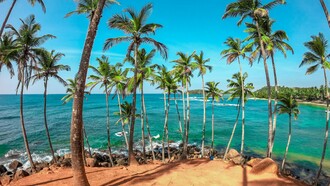At the kiosk where I work, a Venezuelan gentleman arrived today. He must have been at most forty years old, young looking, smiling, and very friendly. He ordered a sandwich and a seven up and told me he was on a one-day stopover, on his way to Rome to visit family he hasn't seen for months. My Spanish colleague asked him how the country was doing. He was very grateful for the question, but gave a short and strong answer: "They are killing our country, they are killing us."
After a silence of a few minutes, he elaborated further. He explained that Venezuela was the most beautiful country in the world, that it had three hundred and sixty-five days of sunshine, beaches with transparent sea, and green mountains. The Venezuelan landscape was therefore, until today, very rich, with kilometers and kilometers of coastline, various peninsulas, mountains, and hills like the Andes, immense lakes, rivers, and small plateaus of infinite beauty and the most luminous views.
He explained that in the seventies it was the fifth richest economy in the world, where companies, many of them Italian, Portuguese, and Spanish, lived well. "There was never a lack of food on the table". It was then that he told his story. He was traveling because he belonged to a privileged family. He had inherited from his father, an Italian gentleman, one of the largest construction companies in Venezuela.
His company is fifty years old today. What would normally be a celebration, the joy he would like to feel was a utopia. From a company of seventy workers, he now had five. Before he died, his mother, a Venezuelan, asked him never to give up fighting. For the company, for his family. For Venezuela. In the meantime, his, mother died and they all emigrated to Italy, only he stayed in his country. Now he tells us that he cannot leave, he cannot do it.
He affirms and stresses that the situation is dramatic. People die every day, dying of hunger, insecurity, and fear. Corruption is indescribable, you even have to pay five times for the same building materials. Everything is controlled by the military. To buy a bottle of water you have to go through a military officer and you never get a receipt.
Even so, he said he couldn't leave. That half of the country that supports Maduro only does so by blackmail: trucks with bags of food distributed in exchange for political support. And that he, being part of the other half, and feeling privileged, does not want to surrender or give up. It should be noted that since 2016 the price of consumption in Venezuela has increased by 800% and the economy has fallen by 18.6%, entering a real economic depression. Inflation from meaning, according to many, makes the country not believe in another solution beyond a huge and strong civil war.
However, that day, the gentleman in front of us confidently told us that when things "turn the other way", when the sun rises again, he would be waiting for us in Venezuela, to welcome us in the most beautiful country in the world.















